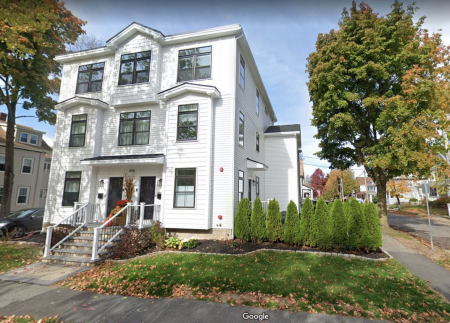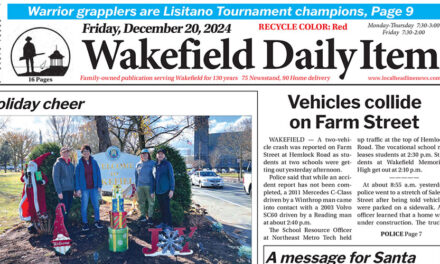
An example of multifamily housing that will be encouraged by the MBTA Communities Act. (File Photograph)
By MARK SARDELLA
WAKEFIELD — Voters will face just eight articles at the Nov. 16 Regular Town Meeting, but that’s no guarantee of a short session. The Town Council discussed the Town Meeting warrant at their meeting on Monday, with most of the attention focused on Article 4, the proposed MBTA Zoning Bylaw.
Article 4 seeks Town Meeting approval of Wakefield’s latest plan to comply with Section 3A of Massachusetts General laws Chapter 40A, also known as the MBTA Communities Multifamily Zoning Law.
The law requires all MBTA communities, including Wakefield, to create at least one multi-family zoning district of reasonable size near public transit in which multi-family housing is permitted as of right. “As of right” means that a property owner or developer may proceed without obtaining a Special Permit, variance, zoning amendment, waiver or other zoning approval.
After a lengthy debate, last spring’s Annual Town Meeting rejected three different compliance plans. Two of those were developed by the Planning Board and one was submitted by a citizens’ petition.
Facing a state imposed compliance deadline of Dec. 31, the Town Council then created its own 40A Subcommittee to create a new plan for the voters to consider at the Nov. 16 Regular Town Meeting.
The state has said that towns that do not comply with the law will face loss of state grant opportunities and possible legal action by the Attorney General.
The 40A subcommittee held a series of meetings and public forums over the summer and into the fall and has, with support from Senior Town Planner Samantha Elliott, devised a plan that it believes will comply with the law. The plan focuses on commercial and previously developed areas while avoiding significant impacts on residential neighborhoods.
Wakefield’s plan needs to have a minimum of 36 acres and 1,696 potential housing units. Seventy-five percent of the district must be near a train station. Up to 25 percent can be away from transit, which is why a developed area of Audubon Road was included.
The proposed district targets already developed areas like Foundry Street, Albion Street, North Avenue and the Greenwood business district. The theory is that, while these areas technically have the capacity for more housing units (which the town would get credit for toward compliance), those units are unlikely to ever be created since the areas are already built out.
Councilor Douglas Butler said that opponents of the plan, whom he referred to as the “never 40A people,” need to understand that the new plan will have “a very minimal impact” on housing and development.
But Councilor Mehreen Butt noted that other people won’t support the new compliance plan because they think it “doesn’t go far enough” in terms of creating new housing.
Councilor Edward Dombroski pointed out that 40A is “not the only way” to address housing shortages.
“This is a state mandate that is being forced on us,” he said, noting that town officials and others could always craft a local plan that addresses Wakefield’s housing needs.
“Where was all this concern before 40A came along?” he wondered.
There was also discussion of the consequences of not complying with 40A, specifically the potential loss of grant opportunities.
In response to a question, Town Administrator Stephen P. Maio said that there has been talk of penalizing noncompliant communities applying for “TIP” funding. (The Transportation Improvement Program (TIP) in Massachusetts provides funding for transportation projects.)
Maio also said that some Department of Elementary and Secondary Education (DESE) grant applications are now requiring communities to certify that they are compliant with Chapter 40A.
“This is a moving target,” he said, adding that every day there is a new area of state funding being targeted if communities don’t comply with Chapter 40A.
Town Councilor Jonathan Chines insisted that millions of dollars in TIP monies could be at risk, including funding for a downtown revitalization program that the town is already heavily invested in.
“I think we need to be crystal clear that the consequences for noncompliance can be quite significant from a financial standpoint,” Chines said.
Chairman Michael McLane agreed, saying that he expects that the consequences of noncompliance will be spelled out on the slides shown at Town Meeting. “Not for fear-mongering,” he stressed. “These are factual things that we are seeing.”
The Town Council voted to approve the Regular Town Meeting warrant.




